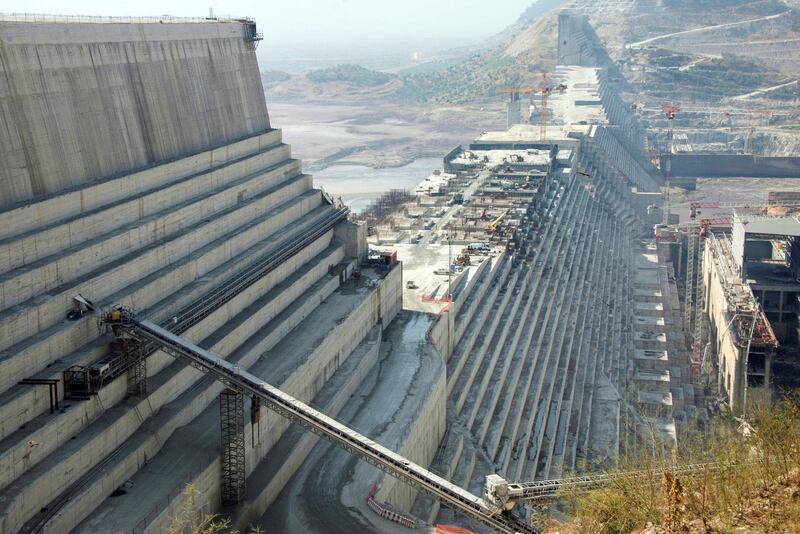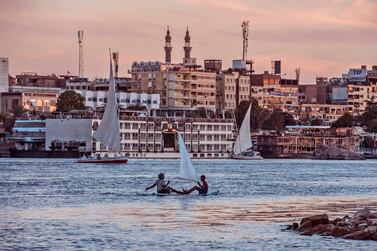Egypt is losing its patience over what it sees as Ethiopia’s procrastination in negotiating a deal to minimize the impact on Cairo’s vital share of Nile waters by a dam Addis Ababa is building on the Blue Nile, implicitly accusing the east African nation of seeking to unilaterally impose its will.
For nearly a decade, Egypt, Ethiopia and Sudan have been engaged in on-and-off talks over the dam’s impact, but have yet to come to an agreement on a timeline for the filling of a giant water reservoir behind the structure.
Egypt, which depends on the Nile for more than 90 per cent of its water needs, wants the reservoir filled over seven years, according to Ethiopia’s water minister, Seleshi Bekele. It has accepted that the $4-billion dam would negatively impact it and was now seeking to minimize the effect.
The Blue Nile accounts for more about 85 per cent of the Nile waters that reaches Egypt. The remaining water volume comes from the White Nile, which joins the Blue Nile near Khartoum, the Sudanese capital, before they flow together downstream through the deserts of northern Sudan and Egypt.
Water ministers from the three countries held talks in Cairo earlier this week, their first meeting in more than a year, but have failed to make a breakthrough in the deadlocked negotiations, an outcome that deeply disappointed the Egyptians.
An Egyptian Irrigation Ministry statement said Ethiopia’s delegates refused to discuss Cairo’s proposals for filling the dam’s reservoir.
The ministers, however, agreed that a panel of “independent” experts should meet in Khartoum on September 30 to discuss the Egyptian proposals followed by another meeting of irrigation ministers on October 4-5, also in the Sudanese capital.
Egypt, however, appears to have found little or no comfort at all in the prospect of further meetings.
Speaking to reporters on Tuesday night, Egyptian Foreign Minister Sameh Shukry said he had found it “ironical” that ministers and experts who met in Cairo this week after a 15-month hiatus did not discuss “technical issues.”
He hoped, he added, that scheduling another meeting of the independent experts in the Sudanese capital later this month was not just another round of “indefinite” and “aimless” talks.
“The objective is not to have successive rounds of aimless negotiations,” he said. “We see this as a basically scientific issue that must be dealt as such; away from political interpretations and away from any party imposing its will or a de facto situation on others,” he added, alluding to Ethiopia.
Egypt has consistently maintained that it accepts Ethiopia’s argument that the dam, formally known as the Grand Renaissance Dam, was essential to that country’s development.
More recently, it said it has also accepted that the dam would negatively impact on it but was seeking to minimize the damage.
“We are open to consultations and reaching an agreement that meets Ethiopia’s development and power-generating objectives and for us to endure a level of damage that we can absorb,” said Mr Shukry, the Egyptian Foreign Minister.
Egypt, Sudan and Ethiopia signed an agreement of principles in 2015 requiring that they reach consensus through cooperation on dam-related issues.
During a visit to Cairo last year, Ethiopian Prime Minister Abiy Ahmed pledged not to allow the dam to hurt Egypt’s water interests.
Construction of the dam began in 2011, but work has fallen well behind schedule and is now expected to be operational by 2020.
Egypt’s president, Abdel-Fattah El Sisi, linked the construction of the dam to the political turmoil in his country following the 2011 popular uprising that toppled longtime leader Hosni Mubarak.
Mr El Sisi told a youth conference over the weekend that Egypt’s political instability at the time may have emboldened Ethiopia to go ahead with the project.
“No one can snatch food from you if you are strong,” he said.







